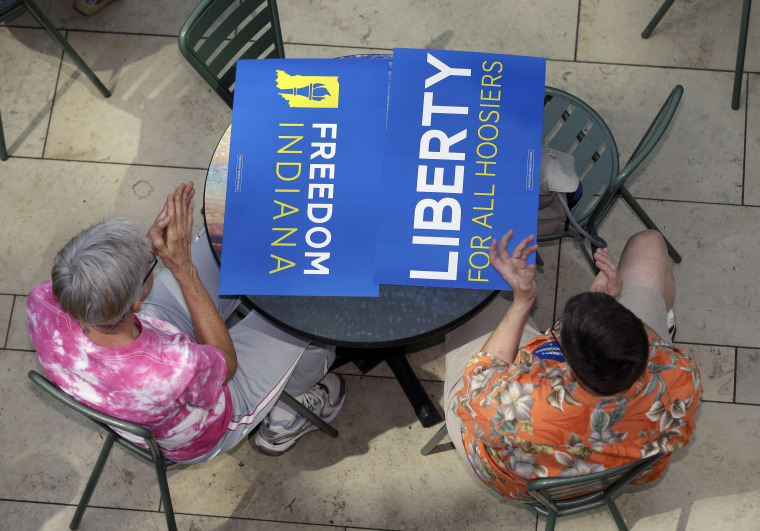A federal court has reserved judgment after hearing oral arguments Friday in a lawsuit seeking to overturn Indiana’s ban on same-sex nuptials.
U.S. District Judge Richard Young, a President Clinton appointee, said he would deliberate and rule at a later date on whether to expand an earlier decision that cleared the way for two women to become the first legally married same-sex couple in the Hoosier State.
Amy Sandler and Niki Quasney were married in Massachusetts last year, more than a decade after they first met. But because the couple lives in Indiana, which only recognizes marriages between heterosexual couples, Quasney’s legal rights to Sandler’s biological children were murky at best. So were Sandler’s rights to make emergency medical decisions or even visit Quasney, who is battling terminal cancer, in the hospital. The couple sought immediate recognition of their marriage so that they could access federal and state benefits for surviving spouses and have their union reflected on Quasney’s death certificate.
Judge Young granted a temporary restraining order against Indiana’s same-sex marriage ban last month, compelling the state the recognize Quasney and Sandler’s union. They were the only couple affected by the judge’s order, which expires on May 8.
But they weren’t satisfied.
“I don’t feel good about it,” Quasney told The Indianapolis Star about the temporary recognition of her marriage. “I don’t want to feel like this should be a special privilege just because I have cancer. I think that does not seem right.”
Attorneys were back in court Friday in the case, Baskin v. Bogan, filed by Lambda Legal in March on behalf of five same-sex couples, including Quasney and Sandler. Both sides asked Judge Young for a permanent resolution in the case, but were told they’d have to wait.
Plaintiffs sought to extend marriage rights not just for Quasney and Sandler, but for all same-sex couples in Indiana.
“The court needs to act now to preserve recognition of the marriage of Amy and Niki, as well as to extend the freedom to marry to all Indiana same-sex couples burdened by the State’s discriminatory marriage ban,” said Paul Castillo, staff attorney for Lambda Legal, in a press release. “Ms. Quasney wants to be recognized as married in her home state while she is still alive, and Indiana has no justification whatsoever for denying them dignity and respect as a family during this extremely difficult time.”
Attorneys for the state argued that Indiana’s statute barring the government from recognizing or performing same-sex marriages should stand based on Supreme Court precedent.
“The state's legal defense of the statute notes that the Legislature has the legal authority to determine how marriage shall be defined within Indiana's borders; and Indiana's Legislature has chosen in statute to define marriage in the traditional way – between one man and one woman – and to not legally recognize same-sex unions granted in other states,” said Bryan Corbin, spokesman for the Attorney General’s office, in a statement. “Moreover, the United States Supreme Court's decision last year in the U.S. v. Windsor case continues to leave this state policy decision-making authority with states and their legislatures.”
The Windsor decision left states the right to determine their own marriage laws. But it also struck down a federal law excluding gay couples from the institution of marriage on the grounds that it violated basic equality and human dignity. No same-sex marriage ban has survived in state or federal court since.
Indiana is one of four states that prohibits gay couples from marrying by statutory provision. The state legislature has proposed or voted on an amendment to enshrine the ban in Indiana’s constitution every year since 2004. State lawmakers succeeded on that front in 2011, but they would have to approve an identical version of the amendment again before it could be put to voters. That effort failed earlier this year.
